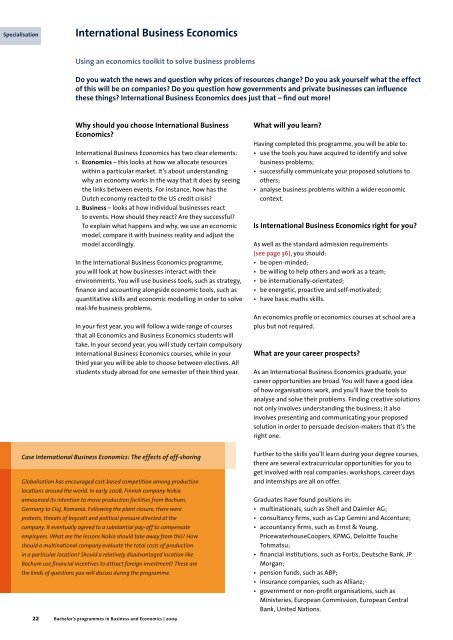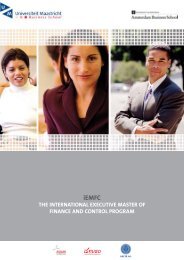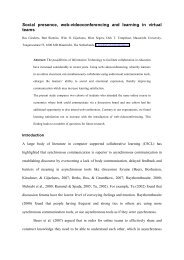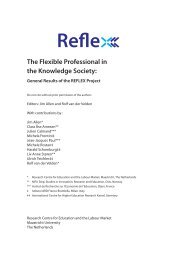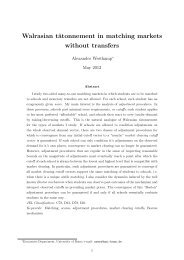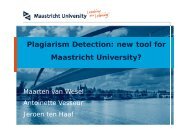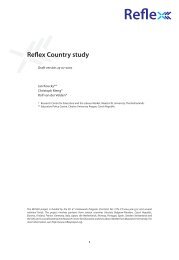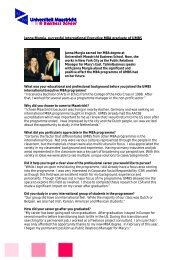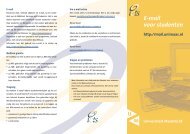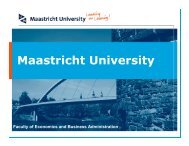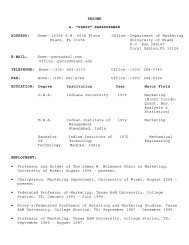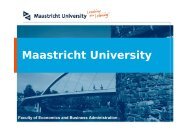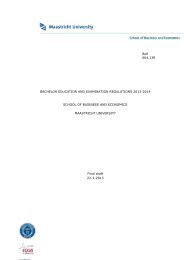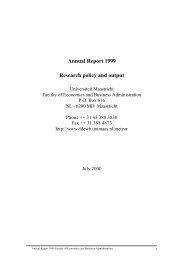Bachelor's programmes in Business and Economics | 2009
Bachelor's programmes in Business and Economics | 2009
Bachelor's programmes in Business and Economics | 2009
Create successful ePaper yourself
Turn your PDF publications into a flip-book with our unique Google optimized e-Paper software.
Specialisation<br />
International Bus<strong>in</strong>ess <strong>Economics</strong><br />
Us<strong>in</strong>g an economics toolkit to solve bus<strong>in</strong>ess problems<br />
Do you watch the news <strong>and</strong> question why prices of resources change? Do you ask yourself what the effect<br />
of this will be on companies? Do you question how governments <strong>and</strong> private bus<strong>in</strong>esses can <strong>in</strong>fluence<br />
these th<strong>in</strong>gs? International Bus<strong>in</strong>ess <strong>Economics</strong> does just that – f<strong>in</strong>d out more!<br />
Why should you choose International Bus<strong>in</strong>ess<br />
<strong>Economics</strong>?<br />
International Bus<strong>in</strong>ess <strong>Economics</strong> has two clear elements:<br />
1. <strong>Economics</strong> – this looks at how we allocate resources<br />
with<strong>in</strong> a particular market. It’s about underst<strong>and</strong><strong>in</strong>g<br />
why an economy works <strong>in</strong> the way that it does by see<strong>in</strong>g<br />
the l<strong>in</strong>ks between events. For <strong>in</strong>stance, how has the<br />
Dutch economy reacted to the US credit crisis?<br />
2. Bus<strong>in</strong>ess – looks at how <strong>in</strong>dividual bus<strong>in</strong>esses react<br />
to events. How should they react? Are they successful?<br />
To expla<strong>in</strong> what happens <strong>and</strong> why, we use an economic<br />
model, compare it with bus<strong>in</strong>ess reality <strong>and</strong> adjust the<br />
model accord<strong>in</strong>gly.<br />
In the International Bus<strong>in</strong>ess <strong>Economics</strong> programme,<br />
you will look at how bus<strong>in</strong>esses <strong>in</strong>teract with their<br />
environments. You will use bus<strong>in</strong>ess tools, such as strategy,<br />
f<strong>in</strong>ance <strong>and</strong> account<strong>in</strong>g alongside economic tools, such as<br />
quantitative skills <strong>and</strong> economic modell<strong>in</strong>g <strong>in</strong> order to solve<br />
real-life bus<strong>in</strong>ess problems.<br />
In your first year, you will follow a wide range of courses<br />
that all <strong>Economics</strong> <strong>and</strong> Bus<strong>in</strong>ess <strong>Economics</strong> students will<br />
take. In your second year, you will study certa<strong>in</strong> compulsory<br />
International Bus<strong>in</strong>ess <strong>Economics</strong> courses, while <strong>in</strong> your<br />
third year you will be able to choose between electives. All<br />
students study abroad for one semester of their third year.<br />
Case International Bus<strong>in</strong>ess <strong>Economics</strong>: The effects of off-shor<strong>in</strong>g<br />
Globalisation has encouraged cost-based competition among production<br />
locations around the world. In early 2008, F<strong>in</strong>nish company Nokia<br />
announced its <strong>in</strong>tention to move production facilities from Bochum,<br />
Germany to Cluj, Romania. Follow<strong>in</strong>g the plant closure, there were<br />
protests, threats of boycott <strong>and</strong> political pressure directed at the<br />
company. It eventually agreed to a substantial pay-off to compensate<br />
employees. What are the lessons Nokia should take away from this? How<br />
should a mult<strong>in</strong>ational company evaluate the total costs of production<br />
<strong>in</strong> a particular location? Should a relatively disadvantaged location like<br />
Bochum use f<strong>in</strong>ancial <strong>in</strong>centives to attract foreign <strong>in</strong>vestment? These are<br />
the k<strong>in</strong>ds of questions you will discuss dur<strong>in</strong>g the programme.<br />
What will you learn?<br />
Hav<strong>in</strong>g completed this programme, you will be able to:<br />
• use the tools you have acquired to identify <strong>and</strong> solve<br />
bus<strong>in</strong>ess problems;<br />
• successfully communicate your proposed solutions to<br />
others;<br />
• analyse bus<strong>in</strong>ess problems with<strong>in</strong> a wider economic<br />
context.<br />
Is International Bus<strong>in</strong>ess <strong>Economics</strong> right for you?<br />
As well as the st<strong>and</strong>ard admission requirements<br />
(see page 36), you should:<br />
• be open-m<strong>in</strong>ded;<br />
• be will<strong>in</strong>g to help others <strong>and</strong> work as a team;<br />
• be <strong>in</strong>ternationally-orientated;<br />
• be energetic, proactive <strong>and</strong> self-motivated;<br />
• have basic maths skills.<br />
An economics profile or economics courses at school are a<br />
plus but not required.<br />
What are your career prospects?<br />
As an International Bus<strong>in</strong>ess <strong>Economics</strong> graduate, your<br />
career opportunities are broad. You will have a good idea<br />
of how organisations work, <strong>and</strong> you’ll have the tools to<br />
analyse <strong>and</strong> solve their problems. F<strong>in</strong>d<strong>in</strong>g creative solutions<br />
not only <strong>in</strong>volves underst<strong>and</strong><strong>in</strong>g the bus<strong>in</strong>ess; it also<br />
<strong>in</strong>volves present<strong>in</strong>g <strong>and</strong> communicat<strong>in</strong>g your proposed<br />
solution <strong>in</strong> order to persuade decision-makers that it’s the<br />
right one.<br />
Further to the skills you’ll learn dur<strong>in</strong>g your degree courses,<br />
there are several extracurricular opportunities for you to<br />
get <strong>in</strong>volved with real companies: workshops, career days<br />
<strong>and</strong> <strong>in</strong>ternships are all on offer.<br />
Graduates have found positions <strong>in</strong>:<br />
• mult<strong>in</strong>ationals, such as Shell <strong>and</strong> Daimler AG;<br />
• consultancy firms, such as Cap Gem<strong>in</strong>i <strong>and</strong> Accenture;<br />
• accountancy firms, such as Ernst & Young,<br />
PricewaterhouseCoopers, KPMG, Deloitte Touche<br />
Tohmatsu;<br />
• f<strong>in</strong>ancial <strong>in</strong>stitutions, such as Fortis, Deutsche Bank, JP<br />
Morgan;<br />
• pension funds, such as ABP;<br />
• <strong>in</strong>surance companies, such as Allianz;<br />
• government or non-profit organisations, such as<br />
M<strong>in</strong>isteries, European Commission, European Central<br />
Bank, United Nations.<br />
Course outl<strong>in</strong>e<br />
There are certa<strong>in</strong> compulsory courses with<strong>in</strong> this<br />
programme, as well as skills tra<strong>in</strong><strong>in</strong>g <strong>and</strong> electives.<br />
22 Bachelor’s <strong>programmes</strong> <strong>in</strong> Bus<strong>in</strong>ess <strong>and</strong> <strong>Economics</strong> | <strong>2009</strong> 23<br />
Year 1<br />
Term 1<br />
Term 2<br />
Year 2<br />
Term 3<br />
Term 4<br />
Year 3<br />
Term 5<br />
Term 6<br />
1<br />
2<br />
3<br />
4<br />
5<br />
6<br />
1<br />
2<br />
3<br />
4<br />
5<br />
6<br />
1<br />
2<br />
3<br />
4<br />
5<br />
6<br />
International Bus<strong>in</strong>ess <strong>Economics</strong><br />
Management of<br />
Organisations <strong>and</strong><br />
Market<strong>in</strong>g<br />
Microeconomics<br />
Industrial<br />
Organisation<br />
Account<strong>in</strong>g<br />
Skills Tra<strong>in</strong><strong>in</strong>g: Philosophy of Science<br />
Macroeconomics<br />
F<strong>in</strong>ance<br />
Bank<strong>in</strong>g<br />
F<strong>in</strong>ancial Markets<br />
Skillls Tra<strong>in</strong><strong>in</strong>g: Quantitative Methods III<br />
Market<strong>in</strong>g <strong>and</strong><br />
Supply Cha<strong>in</strong><br />
Management<br />
International<br />
Bus<strong>in</strong>ess Strategy<br />
Quantitative<br />
Methods II<br />
International<br />
Economic Relations<br />
Skills Tra<strong>in</strong><strong>in</strong>g: Economy Game<br />
Bus<strong>in</strong>ess<br />
Specialisation Course<br />
Bus<strong>in</strong>ess<br />
Specialisation Course<br />
Skills Tra<strong>in</strong><strong>in</strong>g: Elective<br />
Skills Tra<strong>in</strong><strong>in</strong>g: Elective<br />
Study Abroad<br />
Quantitative<br />
Methods I<br />
Account<strong>in</strong>g<br />
Managerial<br />
<strong>Economics</strong><br />
Quantitative<br />
Bus<strong>in</strong>ess<br />
1 Information<br />
Management Elective<br />
1 <strong>Economics</strong>,<br />
Quantitative<br />
or Account<strong>in</strong>g<br />
<strong>and</strong> Information<br />
Management Elective<br />
Capstone Assignment<br />
Fast facts<br />
Communication through learn<strong>in</strong>g<br />
“I chose Maastricht University hav<strong>in</strong>g attended an<br />
open day. Everyone was open <strong>and</strong> communicative<br />
about what they were study<strong>in</strong>g. I now know that it’s<br />
the unique learn<strong>in</strong>g approach that gives students<br />
those skills. It was only later that I decided I wanted<br />
to comb<strong>in</strong>e economics with bus<strong>in</strong>ess <strong>and</strong> follow this<br />
specialisation.”<br />
Gijs Hesen, the Netherl<strong>and</strong>s<br />
International Bus<strong>in</strong>ess <strong>Economics</strong> student<br />
• Programme title: BSc <strong>Economics</strong> <strong>and</strong> Bus<strong>in</strong>ess <strong>Economics</strong><br />
• Specialisation: International Bus<strong>in</strong>ess <strong>Economics</strong><br />
• Language of <strong>in</strong>struction: English<br />
• Duration: 3 years full time<br />
• Start date: 1 September <strong>2009</strong><br />
• Study abroad: compulsory study abroad <strong>in</strong> the third year, <strong>in</strong><br />
the first or second semester<br />
• Study load per week: 8 hrs classes; 12 hrs group work; 20 hrs<br />
<strong>in</strong>dividual study. Total 40 hrs.<br />
• Learn<strong>in</strong>g method: problem-based learn<strong>in</strong>g; guest lectures;<br />
presentations; assignments; papers<br />
• Assessment method: written exams; f<strong>in</strong>al papers; group<br />
participation<br />
• You can obta<strong>in</strong> 180 ECTS credits <strong>in</strong> three years<br />
• Cont<strong>in</strong>u<strong>in</strong>g master’s <strong>programmes</strong> at FEBA without<br />
additional admissions requirements:<br />
MSc International Bus<strong>in</strong>ess, MSc Infonomics,<br />
MSc International Economic Studies, MSc F<strong>in</strong>ancial <strong>Economics</strong><br />
<strong>and</strong> MSc Management of Learn<strong>in</strong>g. You can also cont<strong>in</strong>ue your<br />
studies with other master’s <strong>programmes</strong>, but additional<br />
requirements may apply.<br />
Further <strong>in</strong>formation:<br />
• www.unimaas.nl/feba/bachelors<br />
• www.unimaas.nl/feba/masters<br />
• www.unimaas.nl/feba/studyguide for course <strong>in</strong>formation<br />
• Student Recruitment <strong>and</strong> Communications Office:<br />
+31 43 388 2055 or bachelor<strong>in</strong>fo@efb.unimaas.nl<br />
NB. The details of this programme could change;<br />
before apply<strong>in</strong>g, please check www.unimaas.nl/feba/bachelors<br />
for the latest <strong>in</strong>formation.


